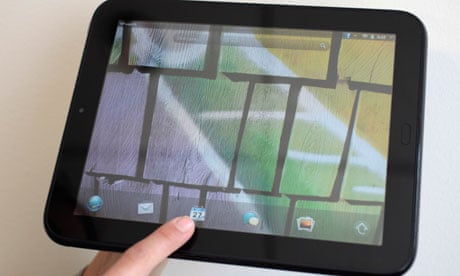Hewlett-Packard is to keep its PC division rather than selling it off, the company has announced, reversing a plan first aired by former chief executive Leo Apotheker - who was fired in September after a boardroom row over his plans for the business.
But the Guardian understands that HP is to shut down its webOS division, acquired for $1.2bn in April 2010 when it bought Palm, and make the staff there redundant or shift them elsewhere inside the company. That could mean losses of up to 500 jobs as the business which created the short-lived HP TouchPad and smartphones is closed.
The dramatic reverse comes in a statement on its website, where HP says that the "continued combination of HP and its Personal Systems Group [is] expected to deliver greater customer and shareholder value".
"HP objectively evaluated the strategic, financial and operational impact of spinning off PSG. It's clear after our analysis that keeping PSG within HP is right for customers and partners, right for shareholders, and right for employees," said Meg Whitman, HP president and chief executive officer, in a statement. "HP is committed to PSG, and together we are stronger."
Under Apotheker, HP had been considering selling or spinning off its PC division, which is the biggest in the world with around 17.7% of the global market. Despite its dominance, the PSG is also the least profitable division within HP.
But new chief executive Meg Whitman has reviewed the wisdom of the plan and decided against it as part of a strategic review. HP's statement says: "The data-driven evaluation revealed the depth of the integration that has occurred across key operations such as supply chain, IT and procurement. It also detailed the significant extent to which PSG contributes to HP's solutions portfolio and overall brand value. Finally, it also showed that the cost to recreate these in a standalone company outweighed any benefits of separation."
No such statement has been made about the webOS group - but top-level staff have been leaving it and the Guardian understands from internal HP sources that staff within the group expect imminent closure. "There's a 95% chance we all get laid off between now and November, and I for one am thinking it's for the best," one webOS employee told the Guardian. That would affect more than 500 jobs.
HP has already suffered losses from the top of the webOS division, with Richard Kerris, who resigned earlier this week as HP's vice-president of webOS worldwide developer relations, moving over to mobile phone company Nokia to do essentially the same job.
Despite HP's attempts to find a potential buyer or licencee for webOS - which ran on the short-lived TouchPad - there has been no apparent interest outside the company. Sir Howard Stringer, chief executive of Sony, told the Guardian on Thursday that he had no immediate interest in buying or licensing it after completing the acquisition of the rest of the Sony Ericsson business. And early suggestions that HTC might purchase it have also fallen away.
Some have suggested that Amazon might buy webOS, seeing the presence on the Amazon board of ex-Palm chief executive and HP executive Jon Rubinstein, who previously worked for Apple. But there is no indication that Amazon is interested in acquiring another operating system; it is using its own version of Google's Android software for its new Kindle Fire device.
Some analysts cheered HP's decision as the right move, adding they were happy that Whitman made the announcement so rapidly. She had previously said the company would make a determination about the business by the end of the year.
"The fact that Meg pushed this decision very quickly is absolutely cleaning up the mistakes of the past," said Gartner analyst Mark Fabbi.
Forrester Research analyst Frank Gillett said HP never should have considered removing its PC unit, and the move to keep it "seems like the right decision for the business given market conditions."
"Hopefully it's the beginning of showing they've got the process and people in place to work these things through," he said. "But it is puzzling that it was hard for them to figure out."
Gillett thinks HP may now be able to thin out its PC family similar to what Steve Jobs did at Apple in order to resuscitate the company in the '90s and focus on just a few devices with attractive features.
"It's something they have the potential to do that few others do," Gillett said.

Comments (…)
Sign in or create your Guardian account to join the discussion